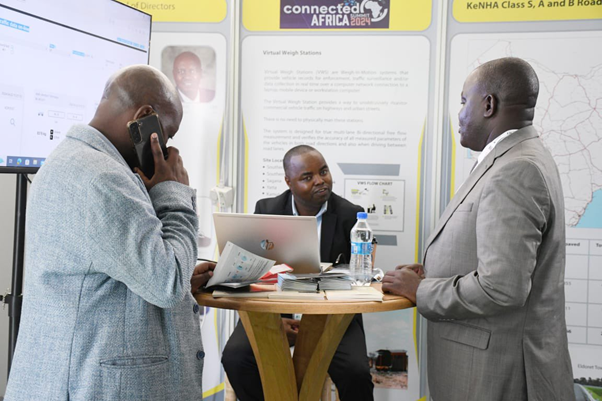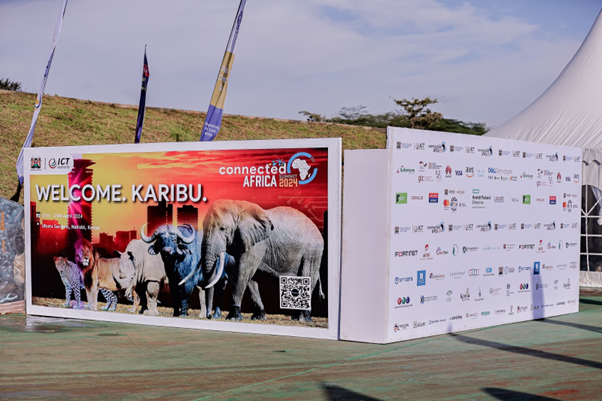
In Nairobi, a bustling hub of ideas, the Connected Africa 2024 brought together industry captains and government leaders from April 22nd to April 25th to discuss the significant role of the digital economy in Africa's growth and development and to explore emerging opportunities and urgent challenges in this rapidly evolving digital landscape. Nearly 2000 delegates gathered to address Africa's ICT priorities, guided by the African Union's (AU) Agenda 2063.
The meeting, at a time when digital transformation is reshaping global economies, underscored Africa's proactive commitment to adopting technological innovations to catalyze economic and social development. Addressing critical issues of the digital age: inclusivity and security. While most African countries are already deploying national strategies for digital governance, a robust framework prioritizes cybersecurity, data protection, and innovation, as part of a broader commitment by policymakers to ensure that the benefits of digitization reach everyone.
"Laying the groundwork for a secure, resilient, and inclusive digital ecosystem for millions of Africans"

Organizers estimated that all these strategies would lay the groundwork for a secure, resilient, and inclusive digital ecosystem for millions of Africans.
"We believe that by coming together at events like the Connected Africa Summit, we can create meaningful dialogue and collaborations that will drive Africa's digital transformation. Safaricom's commitment to this summit demonstrates the company's dedication to co-creating, expanding its horizons, and moving forward into the future," said Peter Ndegwa, CEO of Safaricom. A major player in the regional digital scene, Safaricom, which was heavily involved in the summit, illustrates businesses' commitment to driving digital societies and promoting a sustainable future for the continent. In addition to supporting the summit, Safaricom is expected to launch the Connect Academy, a center of excellence for training and developing qualified fiber optic technicians in Kenya. This initiative aligns with Safaricom's commitment to nurturing local talent and fostering innovation in the country.
Speaking at the closing ceremony, Rigathi Gachagua, Vice President of Kenya, emphasized the urgency of embracing digital transformation, highlighting the rapid pace of technological evolution and the challenges it poses to policymakers and the private sector. He highlighted the power of citizens, especially youth, as a crucial resource to make Africa a major player in the global digital and innovation arena, including in the field of artificial intelligence. According to him, this justifies the strategic opportunity of the summit to promote the emergence of an inclusive Africa where no one is left behind.
Rigathi Gachagua also underscored Africa's unique opportunity to leverage digital innovations for sustainable development. He highlighted Africa's leadership in digital transformation, ready to harness agile and sustainable digital solutions for inclusive growth and development. This positions Africa as a global leader in shaping the future of digital transformation.
"The Nairobi Declaration aims to promote a connected and empowered Africa"
Throughout the summit, discussions focused on major issues such as infrastructure development, digital commerce, AI integration, and policy harmonization. In a joint statement signed by the Ministers of Information, Communication, and Digital Economy from across Africa and foreign ambassadors attending the event, leaders presented a comprehensive roadmap for digital empowerment. This includes initiatives to integrate digital skills into educational programs, develop broadband infrastructure, facilitate digital commerce through the African Continental Free Trade Area (AfCFTA), and promote research and innovation in AI. Ministers and stakeholders also reaffirmed their commitment to fostering a conducive ecosystem for digital innovation and entrepreneurship.
The summit concluded with the Nairobi Declaration, a document adopted by African ICT ministers at the Connected Africa Summit 2024. The Nairobi Declaration, through which African ICT ministers committed to expanding access to the internet and equipping youth with digital skills for inclusive growth, aims to promote a connected and empowered Africa. The declaration calls for increased collaboration among African countries to develop the continent's digital infrastructure and improve access to ICTs for all. A significant document providing a framework for the development of the ICT sector in Africa. It will mobilize the resources and support needed to achieve the continent's digital transformation goals.
Throughout the summit, discussions focused on critical issues such as infrastructure development, digital commerce, AI integration, and policy harmonization. In a joint statement signed by the Ministers of Information, Communication, and Digital Economy from across Africa and foreign ambassadors attending the event, leaders presented a comprehensive roadmap for digital empowerment, encompassing agreements, commitments, and policy resolutions.
This includes initiatives to integrate digital skills into educational programs, develop broadband infrastructure, facilitate digital commerce through the African Continental Free Trade Area (AfCFTA), and promote research and innovation in AI. Ministers and stakeholders also reaffirmed their commitment to fostering an ecosystem conducive to digital innovation and entrepreneurship.

At the end of the summit, the Nairobi Declaration was signed, paving the way for a digitally empowered Africa. African ICT ministers pledged to expand access to the internet and equip youth with digital skills for inclusive growth.




